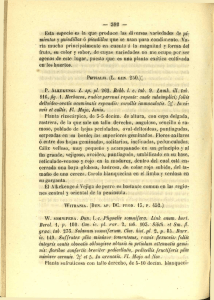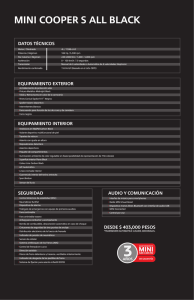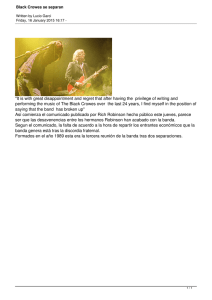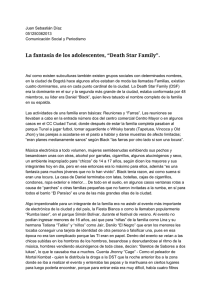X. Montsalvatge: Cinco canciones Negras Cuba dentro de un piano
Anuncio
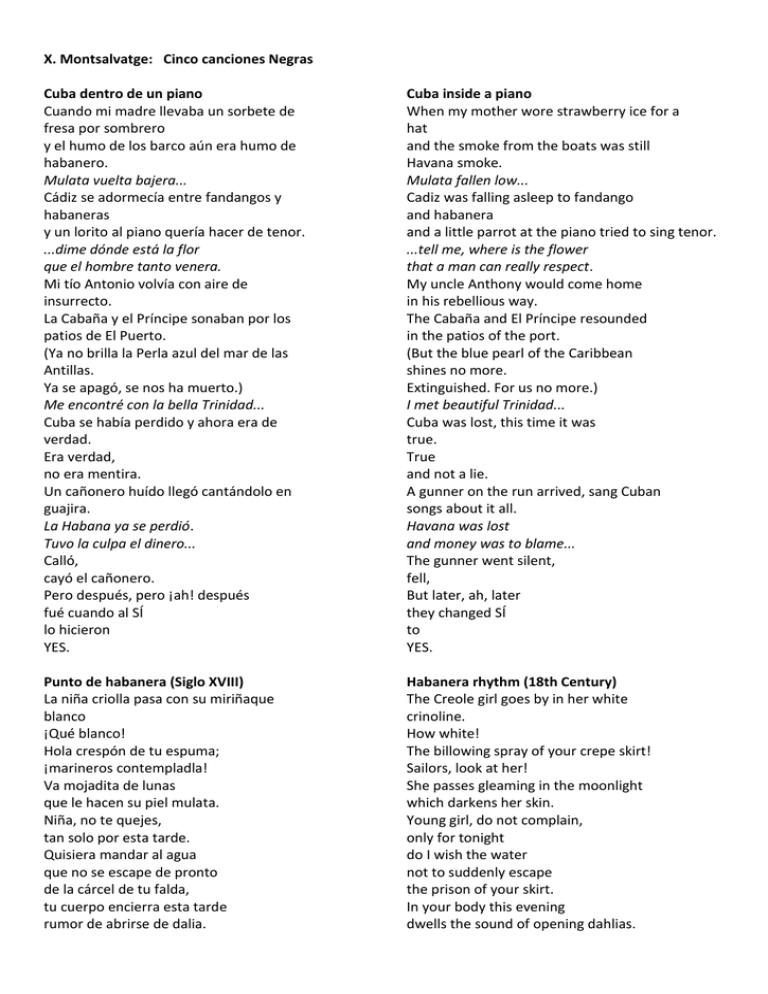
X. Montsalvatge: Cinco canciones Negras Cuba dentro de un piano Cuando mi madre llevaba un sorbete de fresa por sombrero y el humo de los barco aún era humo de habanero. Mulata vuelta bajera... Cádiz se adormecía entre fandangos y habaneras y un lorito al piano quería hacer de tenor. ...dime dónde está la flor que el hombre tanto venera. Mi tío Antonio volvía con aire de insurrecto. La Cabaña y el Príncipe sonaban por los patios de El Puerto. (Ya no brilla la Perla azul del mar de las Antillas. Ya se apagó, se nos ha muerto.) Me encontré con la bella Trinidad... Cuba se había perdido y ahora era de verdad. Era verdad, no era mentira. Un cañonero huído llegó cantándolo en guajira. La Habana ya se perdió. Tuvo la culpa el dinero... Calló, cayó el cañonero. Pero después, pero ¡ah! después fué cuando al SÍ lo hicieron YES. Cuba inside a piano When my mother wore strawberry ice for a hat and the smoke from the boats was still Havana smoke. Mulata fallen low... Cadiz was falling asleep to fandango and habanera and a little parrot at the piano tried to sing tenor. ...tell me, where is the flower that a man can really respect. My uncle Anthony would come home in his rebellious way. The Cabaña and El Príncipe resounded in the patios of the port. (But the blue pearl of the Caribbean shines no more. Extinguished. For us no more.) I met beautiful Trinidad... Cuba was lost, this time it was true. True and not a lie. A gunner on the run arrived, sang Cuban songs about it all. Havana was lost and money was to blame... The gunner went silent, fell, But later, ah, later they changed SÍ to YES. Punto de habanera (Siglo XVIII) La niña criolla pasa con su miriñaque blanco ¡Qué blanco! Hola crespón de tu espuma; ¡marineros contempladla! Va mojadita de lunas que le hacen su piel mulata. Niña, no te quejes, tan solo por esta tarde. Quisiera mandar al agua que no se escape de pronto de la cárcel de tu falda, tu cuerpo encierra esta tarde rumor de abrirse de dalia. Habanera rhythm (18th Century) The Creole girl goes by in her white crinoline. How white! The billowing spray of your crepe skirt! Sailors, look at her! She passes gleaming in the moonlight which darkens her skin. Young girl, do not complain, only for tonight do I wish the water not to suddenly escape the prison of your skirt. In your body this evening dwells the sound of opening dahlias. Niña, no te quejes, tu cuerpo de fruta está dormido en fresco brocado. Tu cintura vibra fina con la noblez de un látigo, toda tu piel huele alegre a limonal y a naranjo. Los marineros te miran y se te quedan mirando. La niña criolla pasa con su miriñaque blanco. ¡Qué blanco! Young girl, do not complain, your ripe body sleeps in fresh brocade, your waist quivers as proud as a whip, every inch of your skin is gloriously fragrant with orange- and lemon trees. The sailors look at you and feast their eyes on you. The Creole girl goes by in her white crinoline. How white! Chévere Chévere del navajazo, se vuelve él mismo navaja: pica tajadas de luna, mas la luna se le acaba; pica tajadas de canto, mas el canto se le acaba; pica tajadas de sombra, mas la sombra se le acaba, y entonces pica que pica came de su negra mala. The bully The chévere with the knife, himself becomes a knife: he stabs slices of moon, but the moon recedes and vanishes; he stabs slices of song, but the song recedes and vanishes; he stabs slices of shadow, but the shadow recedes and vanishes, and then he cuts up, cuts up the flesh of his evil black woman! Canción de cuna para dormir a un negrito Ninghe, ninghe, ninghe tan chiquito, el negrito que no quiere dormir. Cabeza de coco, grano de café, con lindas motitas, con ojos grandotes como dos ventanas que miran al mar. Cierra esos ojitos, negrito asustado; el mandinga blanco te puede comer. ¡Ya no eres esclavo! Y si duermes mucho, el señor de casa promete comprar traje con botones para ser un ‘groom.’ Ninghe, ninghe, ninghe, duérmete, negrito, cabeza de coco, grano de café. Lullaby for a little black boy Lullay, lullay, lullay, so small, little black boy who does not want to sleep. Coconut head, coffee bean, with pretty freckles, and wide eyes like two windows that look out to sea. Close your little eyes, frightened little Black boy; the white devil will no longer eat you up. You are no longer a slave! And if you sleep soundly, the master of the house promises to buy a suit with buttons to make you a “groom.” Lullay, lullay, lullay, sleep, little Black boy, coconut head, coffee bean. Canto Negro ¡Yambambó, yambambé! Repica el congo solongo repica el negro bien negro; congo solongo del Songo baila yambó sobre un pie. Mamatomba, serembe cuserembá. El negro canta y se ajuma, el negro se ajuma y canta, el negro canta y se va. Acuememe serembó aé; yambó, aé. Tamba, tamba, tamba, tamba, tamba del negro que tumba; tumba del negro caramba, caramba, que el negro tumba: ¡Yamba, yambó, yambambé! Negro Song Yambambó, yambambé! The congo solongo is ringing, the black man, the real black man is ringing; congo solongo from the Songo dances the yambó on one foot. Mamatomba, serembe cuserembá The black man sings and gets drunk, the black man gets drunk and sings, the black man sings and goes away. Acuememe se serembó aé, yambó, aé. Bam, bam, bam, bam, bam of the black man who tumbles; drum of the black man, wow, wow, how the black man’s tumbling! Yamba, yambó, yambambé! E. Granados: La maja dolorosa No. 1 ¡Oh muerte cruel! ¿Por qué tú, a traición, mi majo arrebataste a mi pasión? ¡No quiero vivir sin él, porque es morir, porque es morir así vivir! The desolate maiden No. 1 Oh, cruel death! Why have you so traitorously stolen my beloved? I cannot bear to live without him, for life as such is nothing more than death. No es posible ya sentir más dolor: en lágrimas desecha ya mi alma está. ¡Oh Dios, torna mi amor, porque es morir, porque es morir así vivir! It is not possible to feel a greater pain: my soul is drowning in my tears. Oh, God! Return my beloved to me, for life as such is nothing more than death. La maja dolorosa No. 2 ¡Ay majo de mi vida, no, no, tú no has muerto! ¿Acaso yo existiese si fuera eso cierto? The desolate maiden No. 2 Oh, love of my life, no, no, you have not died! Perhaps I could continue on if this were not true? ¡Quiero, loca, besar tu boca! Quiero, segura, gozar más de tu ventura, ¡ay!, de tu ventura. I want to passionately kiss you, I want to share in your happiness. Oh, to share in your happiness. Mas, ¡ay!, deliro, sueño: But, alas, I am raving, phantasizing, mi majo no existe. En torno mío el mundo lloroso está y triste. ¡A mi duelo no hallo consuelo! Mas muerto y frío siempre el majo será mío. ¡Ay! Siempre mío. my beloved no longer exists, the world around me is nothing more than despair, there is no consolation for me, only the chill of death, so will he forever be mine. La maja dolorosa No. 3 De acquel majo amante que fue mi gloria guardo anhelante dichosa memoria. El me adoraba vehemente y fiel. Yo mi vida entera di a él. Y otras mil diera si él quisiera, que en hondos amores martirios son las flores. Y al recordar mi majo amado van resurgiendo ensueños de un tiempo pasado. The desolate maiden No. 3 I ardently treasure those memories of my gallant love who brought me such joy. He adored me fervently and sincerely. I gave him all of my life, and would do so a thousand times, if he wished it, for in the depths of love anguish is only a blossom. When I think of my gallant love, I am engulfed by the dreams of a time gone by. Ni en el Mentidero ni en la Florida majo más majo paseó en la vida. Bajo el chambergo sus ojos ví con toda el alma puestos en mí. Que a quien miraban enamoraban, pues no hallé en el mundo mirar más profundo. Y al recordar mi majo amado van resurgiendo ensueños de un tiempo pasado. Neither in Mentidero, nor in Florida, was I to know others. Under the rim of his hat I saw his eyes directed on me with all of their vitality, they loved the one on which they gazed. And I have never found in this world a gaze more profound. When I think of my gallant love, I am engulfed by the dreams of a time gone by. Manuel de Falla: Siete canciones populares españolas (sel.) El Paño Moruno Al paño fino, en la tienda, una mancha le cayó; Por menos precio se vende, Porque perdió su valor. ¡Ay! The moorish cloth On the fine cloth in the store a stain has fallen; It sells at a lesser price, because it has lost its value. Alas! Nana Duérmete, niño, duerme, Duerme, mi alma, Duérmete, lucerito De la mañana. Naninta, nana, Naninta, nana. Duérmete, lucerito De la mañana. Nana Go to sleep, Child, sleep, Sleep, my soul, Go to sleep, little star Of the morning. Lulla-lullaby, Lulla-lullaby, Sleep, little star of the morning. Canción Por traidores, tus ojos, voy a enterrarlos; No sabes lo que cuesta, Song Because your eyes are traitors I will hide from them You don't know how painful »Del aire« Niña, el mirarlos. »Madre a la orilla Madre« Dicen que no me quieres, Y a me has querido... Váyase lo ganado, »Del aire« Por lo perdido, »Madre a la orilla Madre« it is to look at them in the air. "Mother I feel worthless, Mother" They say they don't love me and yet once they did love me "Love has been lost in the air Mother all is lost It is lost Mother" Asturiana Por ver si me consolaba, Arrime a un pino verde, Por ver si me consolaba. Por verme llorar, lloraba. Y el pino como era verde, Por verme llorar, lloraba. Asturian To see whether it would console me, I drew near a green pine, To see whether it would console me. Seeing me weep, it wept; And the pine, being green, seeing me weep, wept. Polo ¡Guardo una pena en mi pecho, Que a nadie se la diré! Malhaya el amor, malhaya, ¡Y quien me lo dió a entender! ¡Ay! Polo I keep a sorrow in my breast that to no one will I tell. Wretched be love, wretched, And he who gave me to understand it! Ay! C. Gustavino La rosa y el sauce La rosa se iba abriendo abrazada al sauce El àrbol apasionado la amaba tanto ! Pero una nina , una nina coqueta se la ha robado, y el sauce desconsolado la està llorando, ah! The rose and the willow The rose was awakening In the weeping willow’s embrace. The treegod, fondly impassioned, adored her so! But a maiden, a frivolous maiden, Has stolen her away. The willow unconsoled Is mourning his loved one. Ah!
